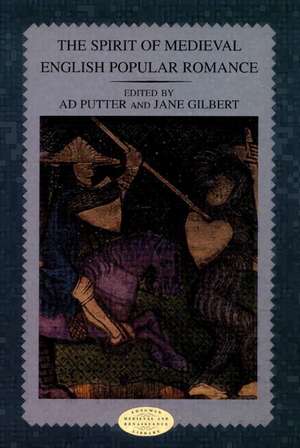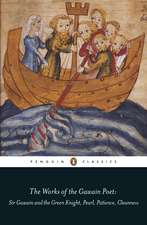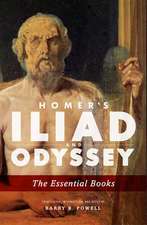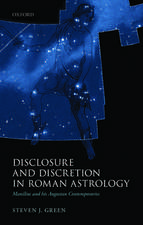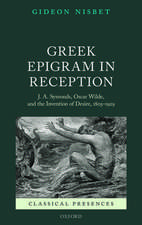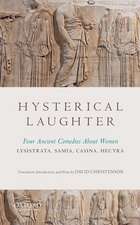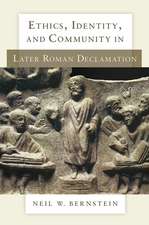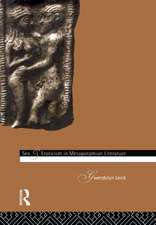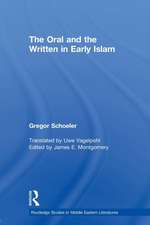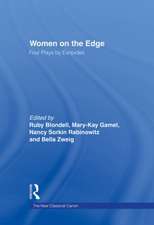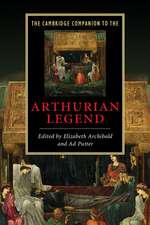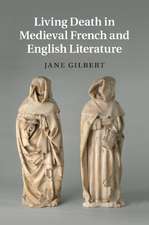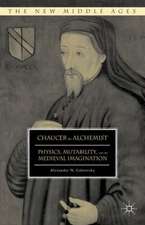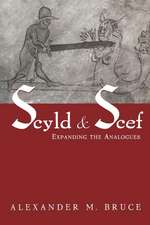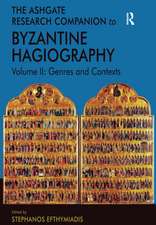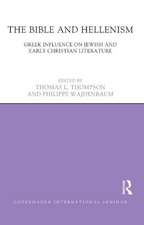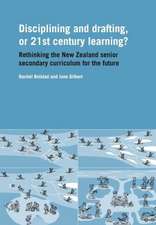The Spirit of Medieval English Popular Romance: Longman Medieval and Renaissance Library
Editat de Ad Putter, Jane Gilberten Limba Engleză Paperback – 16 mai 2000
Accessible to advanced students of English, this book is also of interest to those working in the field of medieval studies, comparative literature, and popular culture.
| Toate formatele și edițiile | Preț | Express |
|---|---|---|
| Paperback (1) | 489.26 lei 6-8 săpt. | |
| Taylor & Francis – 16 mai 2000 | 489.26 lei 6-8 săpt. | |
| Hardback (1) | 1000.27 lei 6-8 săpt. | |
| Taylor & Francis – 22 dec 2016 | 1000.27 lei 6-8 săpt. |
Preț: 489.26 lei
Nou
Puncte Express: 734
Preț estimativ în valută:
93.63€ • 97.20$ • 78.07£
93.63€ • 97.20$ • 78.07£
Carte tipărită la comandă
Livrare economică 22 martie-05 aprilie
Preluare comenzi: 021 569.72.76
Specificații
ISBN-13: 9780582298880
ISBN-10: 0582298881
Pagini: 310
Dimensiuni: 156 x 234 x 18 mm
Greutate: 0.45 kg
Ediția:1
Editura: Taylor & Francis
Colecția Routledge
Seria Longman Medieval and Renaissance Library
Locul publicării:Oxford, United Kingdom
ISBN-10: 0582298881
Pagini: 310
Dimensiuni: 156 x 234 x 18 mm
Greutate: 0.45 kg
Ediția:1
Editura: Taylor & Francis
Colecția Routledge
Seria Longman Medieval and Renaissance Library
Locul publicării:Oxford, United Kingdom
Cuprins
Preface
Notes on references and abbreviations
Introduction
Chapter 1 Lai le Freine: The Female Foundling and the Prolem of Romance Genre
Chapter 2 Lanval to Sir Laurifal: A Story Becomes Popular
Chapter 3 The Tale ef Gamelyn: Class Warfare and the Embarrassments of Genre
Chhapter 4 The Romance Hypothetical: Lordship and the Saracens in Sir Isumbras
Chapter 5 Violence, Narrative and Proper Name: Sir Degare, 'The Tale of Sir Gareth of Orkney', and the Folie Tristan d'OxfOrd
Chapter 6 Loving Beasts: The Romance of William ef Paleme
Chapter 7: The Narrative Logic of Emare
Chapter 8 Tiie Seege ef Troye: 'ff or wham was wakened al this wo'?
Chapter 9 Romance and Its Discontents in Eger and Grime
Chapter 10 From Beyond the Grave: Darkness at Noon in Tiie Awnfyrs qff Arthure
Chapter 11 Gender, Oaths and Ambiguity in Sir Tristrem and Beroul's Roman de Tristan
Chapter 12 Sir Difeo: Madness and Gender
bliography
Notes on contributors
Index
Notes on references and abbreviations
Introduction
Chapter 1 Lai le Freine: The Female Foundling and the Prolem of Romance Genre
Chapter 2 Lanval to Sir Laurifal: A Story Becomes Popular
Chapter 3 The Tale ef Gamelyn: Class Warfare and the Embarrassments of Genre
Chhapter 4 The Romance Hypothetical: Lordship and the Saracens in Sir Isumbras
Chapter 5 Violence, Narrative and Proper Name: Sir Degare, 'The Tale of Sir Gareth of Orkney', and the Folie Tristan d'OxfOrd
Chapter 6 Loving Beasts: The Romance of William ef Paleme
Chapter 7: The Narrative Logic of Emare
Chapter 8 Tiie Seege ef Troye: 'ff or wham was wakened al this wo'?
Chapter 9 Romance and Its Discontents in Eger and Grime
Chapter 10 From Beyond the Grave: Darkness at Noon in Tiie Awnfyrs qff Arthure
Chapter 11 Gender, Oaths and Ambiguity in Sir Tristrem and Beroul's Roman de Tristan
Chapter 12 Sir Difeo: Madness and Gender
bliography
Notes on contributors
Index
Recenzii
'.....these new essays offer varied and thoughtful approaches to a group of relatively little known romances, and are successful in demonstrating their interest for the literary critic as well as the historian or linguist.' Corinne Saunders, Notes and Queries. 'The book is worth recommending to students as an accessible starting point...' Christopher Dyer, University of Leicester 'The reading of the articles proves in itself to be an entertaining, aesthetically satisfying and scholarly redeeming act and whets the reader's appetitie for the original texts...' - Dr Thomas Honegger, Chair of Medieval Studies, Friedrich-Schiller-Universitat Jena.
Descriere
This collection of twelve specially commissioned essays provides a stimulating guide to the Middle English popular romances. These were very popular in later medieval Britain and even today students of medieval literature will encounter examples of the genre, such as Sir Orfeo, Sir Tristrem, and Sir Launfal. Each essay introduces one popular romance, setting it in its literary and historical contexts, and develops an original interpretation that reveals the possibilities that popular romances offer for modern literary criticism. A substantial introduction by the editors discusses the production and transmission of popular romances in the Middle Ages, and considers the modern reception of popular romance and the interpretative challenges offered by new theoretical approaches.
